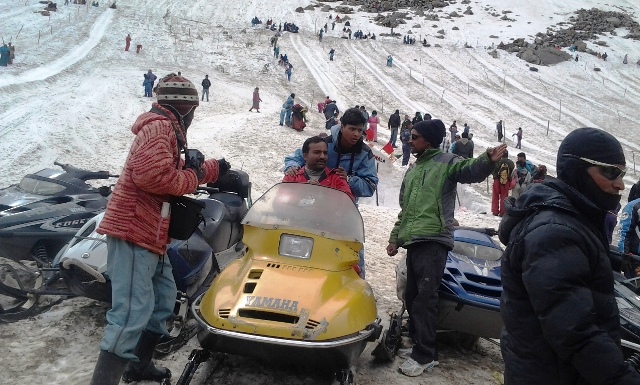Manali: Picturesque town of Manali, in the western Himalayas has become a perfect Summer getaway destination over the past few years.
Nestled at about 2000 meters with imposing Deodar forests and fast flowing river Beas set against the backdrop of high snow–clad mountains with numerous steams cascading down from high cliffs ending as family waterfall and Hospitable local peoples, this town is abuzz with tourists these days.

As a tourist destination Manali was little known to the people outside till it came into prominence after Jawhar Lal Nehru, the country’s first prime minister visited Manali in June 1958 for his month long holiday along with his family members Indira, Rajiv and Sanjay.
Another turning point for making Manali a Mecca for tourists was establishment of Western Himalayan Mountaineering Institute in 1961. The construction of Mandi-kullu road in 1927-28 paved the way for inflow of tourist’s traffic.
Till then there was no accommodation available for staying tourists in Manali. Perhaps it was Major H.M Banon who constructed first guest house in Manali named Sunshine Guest house.
It was only after 1958, people felt need of constructing guest houses, hotels and guest accommodation which could boost tourism and uplift the economy of the people.
Before independence some officers of the British goernemnt, English travellers, trekkers and adventure lovers, dared to travel to this place for official and some other purposes.
Prominent British officers who visited Manali and beyond were George Trebeck & Moorcroft, J G Gerard, AFP Harcourt, Egerton, Alexander Cunningham, Duff Dunbar, G.G Bruce, Penelope Chetwode, Lady Willington and Mr. & Mrs. Graff.
Some of them settled permanently here. Descendants of the Banons and Johnsons, who married local belles, are still in Manali.
Retired British officers who settled in Kullu valley were Lees of Bandrole, Ronnicks of Bajaura, Minikens of Raison, Donalds of Naggar, Theodores of Dhobi, Tysons and Mackeys of Katrain.
Captain Lees of Bandrole, was the first person, who in 1870 experimented with growing apples in Kullu valley. He planted British varieties of apples such as Coxes Blenheim, Orange Newton, Russet, Marie Lousie and William pears and was a runaway success.
Now Manali can boast of having tourist infrastructure, suiting every kind of tourists. Manali is one of the only Hill stations in the world, where at a crows fly distance of 50 kms, one can experience Snow Sports, Aero Sports and Water Sports.
Tourists, domestic and foreign are increasing each year in Manali. In year 2011, there has been an increase of about 17 Lakh tourists when compared to 2001.
Facilities for adventure sport activities like mountaineering, trekking, camping, skiing, hot air ballooning, heli-skiing, paragliding, mountain biking and jeep safari here is extremely popular with adventure sport lovers.
Another attraction near Manali is the Rohtang Pass. At an altitude of 3978 mts full, the pass has snow in the summers and tourists throng to get there.
The Rohtang pass, it is in fact the gateway to the Lahaul valley that offers some awe inspiring mountain escapes, with Barashigri-the longest glacier of Asia, within easy reach.
Near Manali there are spots like Dashaur Lake, Bhrigu Lake, Chandertal Lake, Hamta and Lamadung that can be reached by trekking paths.
Adding to all, there is a newly opened Dhakpo Shedrup Ling Monastery at Kais, 30 Kms from Manali on left bank which is first of its kind in Himachal Pradesh and third in the world which has become a special attraction for international and national tourist.
.
Number of Tourists visiting Manali
Year Domestic Tourists International Tourists
2000-2001 1,001,296 41,891
2009-2010 2,395,990 133,707
2010-2011 2,659,527 138,488
Photo: Sanjay Dutta

Sanjay Dutta, an engineer by qualification but is a journalist by choice.
He has worked for the premier new agency Press Trust of India and leading English daily Indian Express.
With more than a decade of experience, he has been highlighting issues related to environment, tourism and other aspects affecting mountain ecology.
Sanjay Dutta lives in a village close to Manali in Kullu valley of Himachal.



